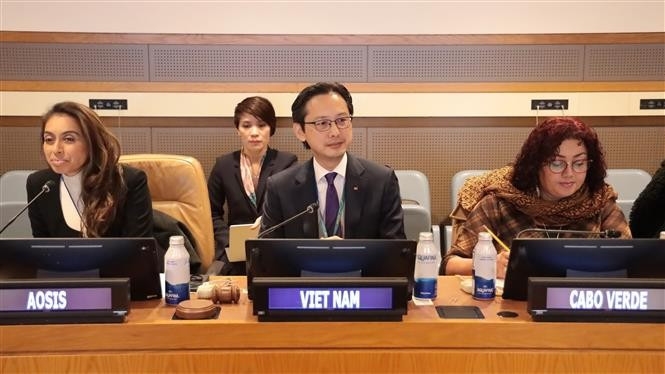He made the call while chairing an international seminar on preparations for the effective implementation of the BBNJ Agreement, held on November 1 as part of International Law Week at the 80th session of the U.N. General Assembly.
    |
 |
|
Ambassador Do Hung Viet, Permanent Representative of Vietnam to the U.N., chairs the seminar. |
The event, co-organized by Vietnam and Singapore, and co-sponsored by Australia, France, Costa Rica, Belize, and the Alliance of Small Island States (AOSIS), brought together leading experts and scholars on the law of the sea, along with representatives from nearly 100 countries across five continents.
Adopted by the U.N. General Assembly on June 19, 2023, after nearly two decades of negotiation, the BBNJ Agreement has so far been signed by 145 countries and ratified by 75. It will enter into force on January 17, 2026, after reaching 60 ratifications on September 19, 2025. Vietnam was among the first signatories and among the earliest to complete domestic ratification.
Since its adoption, a preparatory committee has convened two sessions to discuss procedure rules and structures for institutions to be established under the agreement, including the Conference of the Parties (COP), the scientific and technical body, the financial mechanism, the compliance committee, and the Secretariat. These efforts aim to ensure effective implementation of the agreement.
At the event, Ambassadors and legal experts from France, Costa Rica, Cabo Verde, Palau, Sierra Leone, the AOSIS, and other countries discussed opportunities and challenges in implementing provisions on environmental impact assessment (EIA), area-based management tools (ABMTs), and financial mechanisms, drawing on lessons from existing multilateral agreements.
As keynote speaker, Dr. Nguyen Thi Lan Anh, Vietnam’s candidate for judge at the International Tribunal for the Law of the Sea (ITLOS) for the 2026–35 term, stressed that capacity-building and technology transfer are essential for the effective implementation of the BBNJ Agreement, helping developing nations strengthen legal frameworks, enhance marine research, and engage more substantively in exploring and using marine genetic resources.
She urged developing countries to assess priorities, promote regional and international cooperation, and make full use of the Agreement’s institutional and financial mechanisms to protect national interests while contributing to global efforts to conserve and sustainably use marine biodiversity in areas beyond national jurisdiction.
Source: VNA